Anthony Tolliver: ‘Jimmy Butler is the best leader I’ve ever played with’

Anthony Tolliver, the 13-year NBA veteran known for his ability to shoot threes and play for many a franchise (11 to be precise), recently sat down with HoopsHype to discuss Jimmy Butler, Nick Nurse, and going to the same high school as Brad Pitt.
What’s something you learned from basketball from a life perspective?
Anthony Tolliver: Yeah. So, I would say sports in general, but basketball definitely taught me a lot of life lessons. One of them being the linear relationship between hard work and success. The inconsistency in hard work, consistency, and success is linear. If you take them all into account, working hard without consistency won’t lead to success. Similarly, being consistent without working hard won’t result in success. However, if you have hard work and consistency, it turns into success. After reaching the highest level, it has shown me that I’m capable of anything. Moving forward, it’s just figuring out the things I want to accomplish because I have the blueprint, and sports taught me that. Basketball taught me how to succeed.
You went to the same high school as Brad Pitt, how was it following that legacy?
AT: I mean, he’s a movie star. Obviously, it’s hard to beat Brad Pitt in a popularity contest. He’s kind of the big shot that came from my high school. I actually had a classmate, Lucas Grabeel, who was one of the stars in High School Musical. We graduated the same year from Kickapoo. I don’t know if Brad Pitt had any big-time sports guys in his year. One of the most popular movies of all time is High School Musical, and with me playing in the NBA for 13 years, we had a pretty strong class. We also had a guy we graduated with who has won multiple Grammys for producing. So, yeah, we have a very successful class.
What was your experience in the G League and with a young Nick Nurse, how did those early years shape your career?
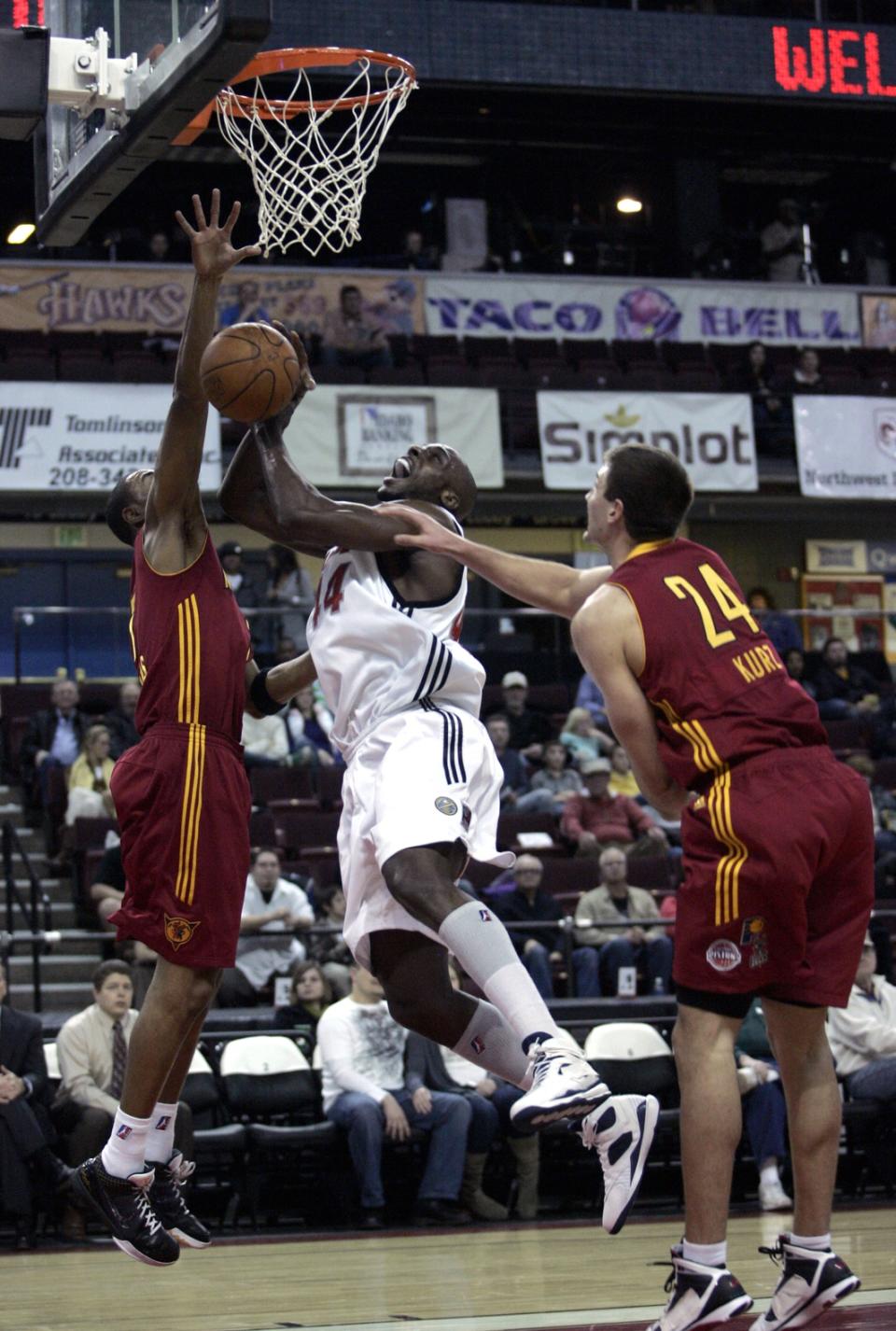
AT: Yeah, [Nick Nurse] was coaching in the British League before becoming the head coach with the [Iowa] Energy. At that time, I always respected his unique coaching style. He was much different than others in the way he acts. He allowed players to be more vocal than any other coach I had played for, probably any other coaching I’ve ever had, period. You might ask our opinion, “Hey, what do you think we should do in pick-and-roll?” ‘Well, I think that the guard would really struggle if I showed.’ ‘Okay, let’s show,’ right? Instead of being a dictator, he was a true collaborator, saying, “Hey, you’re the one who’s out there. You probably have some ideas that could work now.” Was it every time, 100 percent of the time, that he always listened to the player? No, but I’d never had a coach ask for our opinion. So, that was a really cool deal, having a coach with more flexibility, thinking outside the box. In my opinion, that’s what describes Nick Nurse to a tee. I haven’t played for him since the first couple of years of my professional career. However, what described him well was his time as a rookie head coach with the Toronto Raptors in the Finals against the Warriors, playing box-and-one. That move was like, “Let’s throw a box and just screw them up. They’ve never prepared for boxing-and-one in the NBA. That’s ridiculous. No one does that.”
Did you foresee Nick Nurse becoming an NBA coach during your time playing for him?
AT: Um, no, I did not think, just from playing for him, that he would be a head coach one day. Yeah, this guy’s gonna be a head coach one day. Honestly, being a head coach is kind of a crapshoot, you have to get lucky, not gonna lie. There are only 30 head coaches. There are many guys who deserve to be head coaches, but most won’t get the opportunity due to timing. You need an entire organization willing and able to believe in your leadership ability. It’s similar to playing in the NBA, especially as a role player or non-superstar, it’s all about timing. Being in the right place at the right time and available when a team needs to fill a spot. If the teams that want you don’t have a spot or can’t maneuver to get you, you won’t play in the NBA. You divide that by 10, as there are only 30 head coaches and 400-plus players. That’s your coaching career. As a head coach, there are many assistant coaches, but only one head coach on the team. I would never say, “Oh, man, he’s gonna be a head coach one day,” but I did respect him as a coach. His style was different, but I enjoyed playing for him.
How did your experience in the G League prepare you for the extended career as a journeyman who consistently played?
AT: What the D League did was exactly what it told and said it was going to do: it developed me. It has the ability to develop guys through both individual work and playing the game. The only way to develop a player is by doing individual work and then implementing those things into the game. Having the ability to play and play a lot of minutes is where you develop. Doing a bunch of individual work and never getting on the court to implement it means you can get incrementally better, but true development comes from doing both. Even in the first few years, if I would have been on the end of some NBA bench, of course, I would have gotten better practicing every day with NBA players and maybe playing some scrimmages with young players or something like that. However, true development comes from the games and everything else. That’s what I got the most out of it: the ability to play significant minutes, 30-35 minutes per game, and just figure it out.
Transitioning from a star player at Creighton to an undrafted role player with changing teams and roles, how did you adapt and stay prepared for every opportunity in your career?
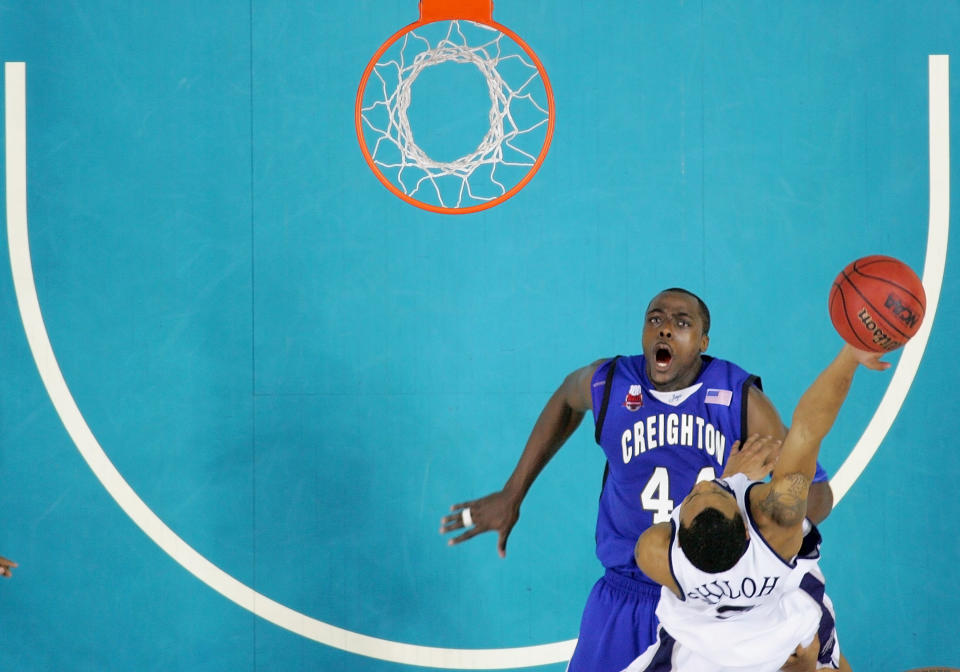
AT: Yeah, that was difficult. That became the job, my brand was, ‘He’s always ready, always available, always consistent, and won’t make mistakes’. Every NBA team needs or wants those types of guys on their bench. I learned that at a young age, that if I fulfill multiple areas and be a pillar for a coach, someone they know exactly what they’re gonna get, it doesn’t mean I’ll jump the highest, block every shot, get every rebound, or make every shot. I won’t stop every person, I won’t be perfect. Nothing about my game was like, “Oh my gosh, this dude’s the best in the NBA/world at this.” The closest was certain seasons where I shot at a very high level. The best I’ve ever ranked in a season was fifth in three-point percentage, which is obviously really good. But it’s not like I was Top 5 every single season. The four years at Creighton under Coach [Dana] Altman, taking charges, diving for loose balls, doing tough stuff, became a part of my identity when I played. Combining discipline, consistency, and doing the tough stuff made me a coach’s dream. Moving around and getting traded a couple of times wasn’t a big adjustment because I knew exactly who I was and what role I was fulfilling. I didn’t need to change roles every year. I’d come in, knock down shots, play great defense, do the tough stuff, not complain if I don’t play, be the best teammate, and stay out of trouble off the court. Whether in Minnesota, Portland, San Antonio, Phoenix, Charlotte, Atlanta, it doesn’t matter. That’s Anthony Tolliver.
Being a player for multiple franchises, and not just once but multiple times, such as playing for Detroit and Minnesota twice, did it feel routine going back?
AT: Each one of them had their own unique experiences. Going back to Minnesota, the first time we were pretty bad. The second time, it was a team with Andrew Wiggins, Karl-Anthony Towns, Jimmy Butler, Jeff Teague. We had guys that made the playoffs the previous year, we’re the eighth seed, but Jimmy had missed like 28 games. I’m a free agent coming off one of the best years of my career, and I’m thinking, “Man, Minnesota, the only thing they were missing last year was shooting.” So I’m thinking, “Man, I’m about to go to Minnesota and fill this gap. I’ve already been there before. They built up this incredible team with three really good players that we can play by and be around. I’m going to be shooting open shots all day with those three guys on the court.” But I just didn’t realize it was a dumpster fire. No one told me it was a dumpster fire prior to signing. Yeah, that situation turned sour really quick for many different reasons. But at the end of the day, it was a cool experiment. It was also cool to go back to places and back to organizations because that usually means if somebody’s willing to have you back, it usually means that they had a pleasant experience with you the first time around. That was a compliment in my eyes.
Was that infamous practice with Jimmy Butler as crazy as depicted by the media?
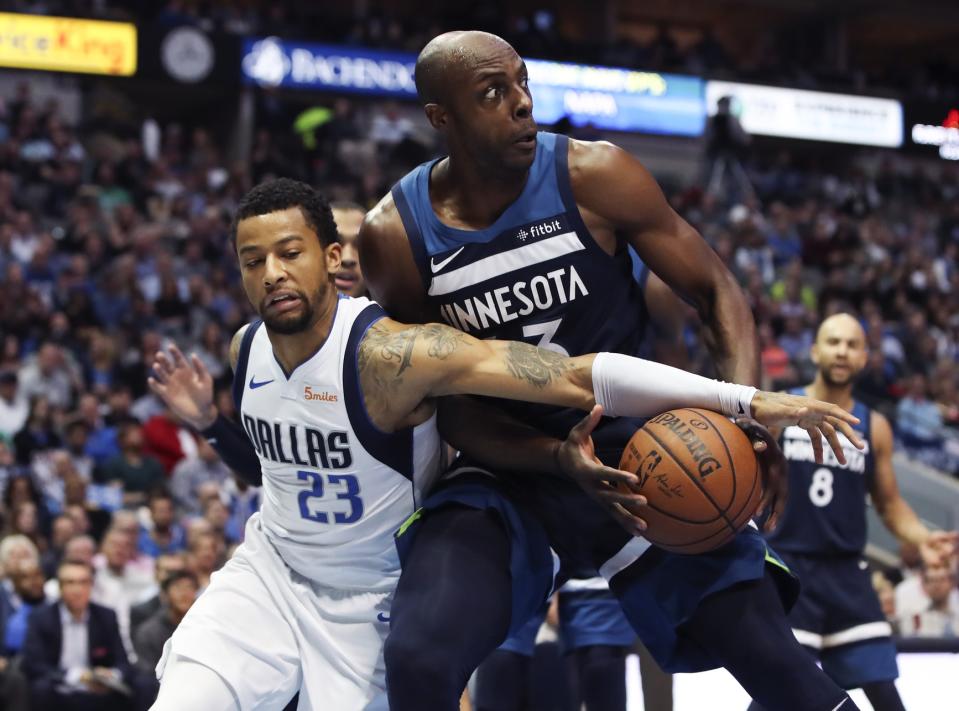
AT: It was accurately depicted, I guess is the best way to put it. Probably most of the things you’ve heard about it are true. I was there, for the whole thing. I haven’t really heard anything that was over-exaggerated, even like, wow. Pretty sure every report I’ve heard about how it went and everything else, and how he left the practice early, and went and did an interview with Rachel Nichols. We got done with our practice. By the time we were in the locker room, he was on ESPN. It was bizarre. It was something that we didn’t even know how to react to because it was so bizarre. It was truly awkward.
Was it awkward, and have you ever been apart of a situation like that before?
AT: For sure. It was super awkward the entire time with him there because he didn’t want to be there. He’s a great guy. I still, even to this day, I’ve always said that Jimmy is the best leader I’ve ever played with. People might think that’s nuts because they saw him doing what he was doing. I know Jimmy is a much different person outside of practice and all that stuff, just from playing with him and seeing his ability to infuse confidence into his teammates. That was what defined that practice, his ability to play on the third-string team. The third-string team was made up of guys who were really vital for the third string because it was four guys that were basically roster fillers for camp and Jimmy. That was the entire team. It was James Nunnally, who kind of stepped back and forth and had a little bit of time in the league. There’s a kid from Marquette, a little fast, super athletic guy. I can’t remember his name. But anyway, these were guys who, at best, had small stints in the NBA. Not that they weren’t talented, they were never talented. They were in camp for no reason. But they were not guys that you would say, “Oh man, they’ve been around the league for 10 years or five years or even three years.” They were all guys who maybe stuck for a little bit but mainly played overseas and stuff like that.
So, like Darius Johnson-Odom, Jared Terrell, CJ Williams. Those guys?
AT: Yes, that’s correct. And he took that team and won every one of the games. He beat the first team twice, beat us once. I was on the second team with, like, I can’t even remember now, but it literally was just like the bench team, right? The guys who were our second unit, which the first time they played the starters, beat us by 12, so it wasn’t even close. They destroyed us. Then the second game, we played them, and we knew we had to bring it. They brought their A game, so we brought it, and they still beat us 12 to 11. Then the third game, the starters had a better showing, but they still got beat again. After that, right after that, Jimmy just walked out. It’s like crazy. I don’t know if people realize this, but the craziest thing about that practice was that Jimmy shot one shot the entire time.
So was everyone else score, Jimmy was just facilitating?

AT: And so, remember, I go back to what I said earlier: Jimmy is the best leader I’ve ever played with. It’s because he can take someone who, like I said, guys who are fringe NBA players at best, right? He took them and made them in one practice, three scrimmage games. So, it’s not like you’re gonna say, “Oh, still,” but listen, I’m gonna bring this into today’s world, right? He took those guys, and he purposely did not shoot because he wanted to show how dominant he truly was. He wanted to show that he was the best player on our team. Because they didn’t pay him max money. He was like, “Screw you guys.” Now, I don’t know all, I know there’s some other stuff too. It wasn’t just about money, but that was a big part of it too. They didn’t pay him what he thought they should have. They should have paid him.
This wasn't against Thibs? Butler was more against the front office?
AT: Oh, it was against all of them. It was against everybody. He never had a lot of the blame put on him having beef with KAT and we can work with? Oh, it wasn’t about them. Like disrespect. I truly believe 90 percent of it was from the front office and above, like everybody outside of our locker room. That’s my interpretation. Right? Do I think that he thought that KAT and Wiggins could have played harder? Yes. He made it very clear in the media. Andrew Wiggins is one of the most gifted players he has ever seen in his entire life, which is completely true. KAT is one of the most skilled big men ever in the history of the league. So, it’s not like he was jealous or something. He’s like, no, these guys are incredible players. He saw more, I think he saw more in them than they saw in themselves, which rubbed him the wrong way. He’s like, I should not be outworking you guys. You guys need to be working as hard as me or more. How ever many years older, new, whatever. Remember what I just said earlier, with third-string fourth-string guys, he went in one of those games and I said, you know, it’s one practice, but look what he did last year. How many guys were on the Heat last year, either fringe NBA players or undrafted, or undrafted guys, right? How many guys were on the Heat last year, undrafted people?
Do we give 'Heat Culture' too much credit instead of Jimmy Butler?
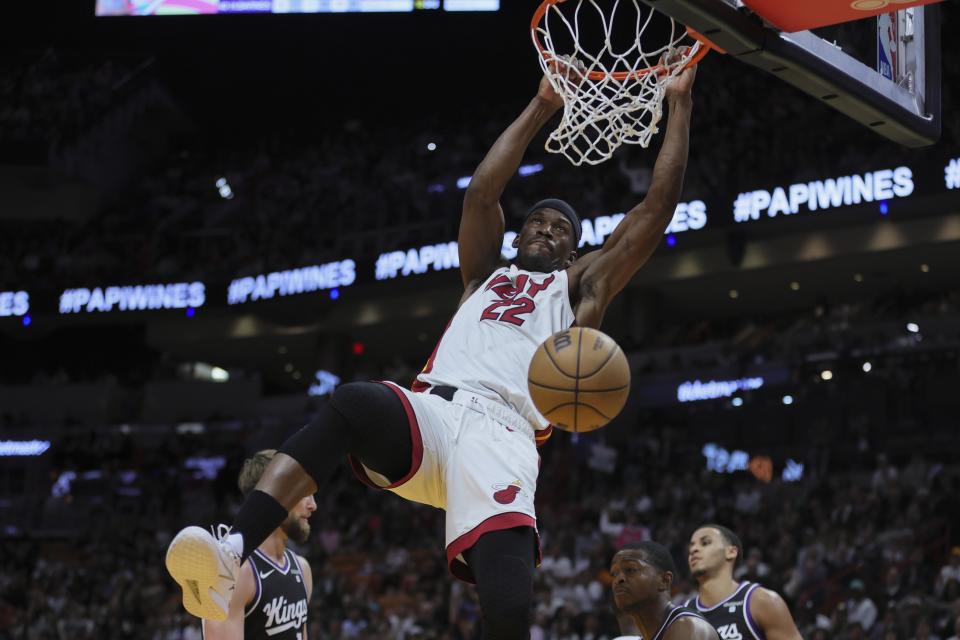
AT: So think about the Heat before Jimmy, right? They were superstars. They had Dwyane Wade and Shaq and Alonzo Mourning, and like, that’s what made them really good. I mean, don’t get me wrong. Their role players are great, but when they won the championship, D Wade, Shaq, role players were Antoine Walker, Gary Payton. I mean, come on. Like, you know, these are ridiculously good players. Right? None of those guys were undrafted or whatever. What Jimmy has done, you know, to a guy like Duncan Robinson, obviously, but he’s made his name for himself for multiple years now. All these new guys, though, that no one really knew. All of a sudden, these guys look like killers. Right? They look unbelievable. Why? It’s because Jimmy, like Jimmy is that dude, he’s just freaking good.
How does Jimmy Butler motivate people so well?
AT: Well, I mean, he’s just a professional hype guy. No, I’m serious. Like he knows how to. He knows exactly what to say and how to say it to certain people in order to get the absolute most out of those people. I truly believe that. That’s why I said, he’s such a good leader because that’s what leaders are supposed to do. That’s one of the biggest functions of a leader: the ability to get the most out of the players that you have. Just to have somebody like that, that can do that at that level, it’s pretty incredible.
You played under Flip and Ryan Saunders, was it weird how he became coach and then quickly replaced by Chris Finch?
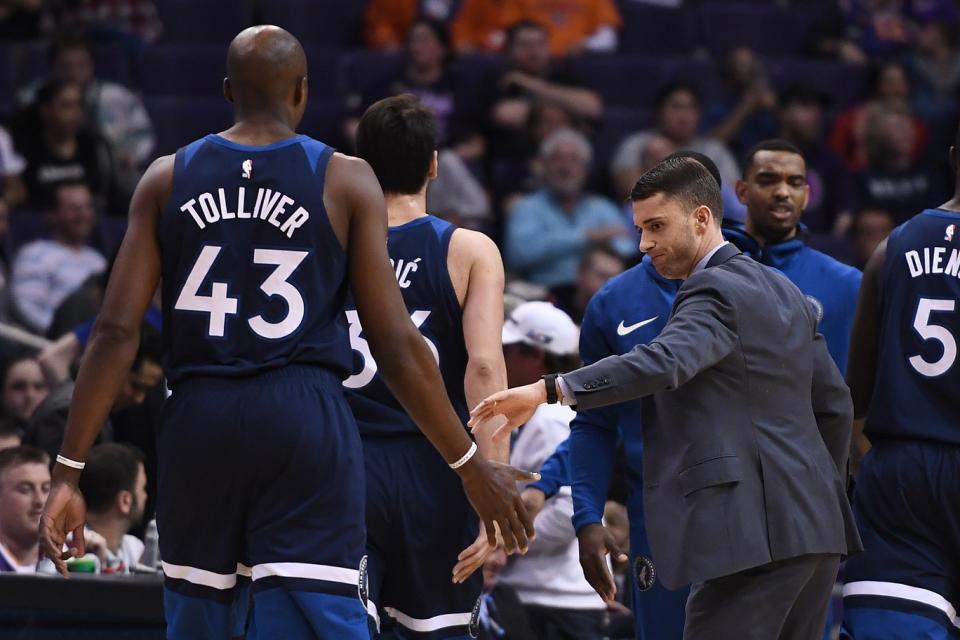
AT: I think that’s it. Yeah, I think that’s it. It was one of the biggest reasons why it was because I believe he’s younger than me. I’m pretty sure. So that was weird because that was the first time in my career I had a head coach that was younger than me. And so that was interesting, but it wasn’t like I thought he did a great job. Honestly, the circumstance that he was put into and everything else, it wasn’t like he inherited this unbelievably great, talented team. We had just traded Jimmy and there were a lot of moving parts, right? A lot of drama and distraction. I thought he came in and did as good of a job as you could do with the circumstances that were there. He stayed really poised. I think that hopefully one day, he’ll get another opportunity to be a coach, if that’s his desire. Obviously, he’s had some success with Denver and got a championship last year. So that’s never a bad situation to be in. But I’m assuming he wants to be back on that sideline as a head coach once again in the future, and I think he’ll have a lot of experience to pull from the next time around that can serve him as a head coach.
Do you think basketball IQ is as high as it should be?
AT: Yeah, it’s an interesting question. I would say that they’re definitely teaching a lot, or they’re playing a lot of games, not doing a lot of practice. I would say that’s one of the reasons why basketball IQ isn’t as high because it’s less practice and more games. But I think as a whole, which is kind of the opposite, there’s a lot of people who have played a lot less pickup basketball. Pickup basketball, at least my personal experience, was all I wanted to do growing up. I wanted to work on my game, but I also wanted to play with my friends. Let’s get 10 guys together, find a court, and play basketball. There are things you’d learn organically by just playing. But as I got older and phased out of playing every day, I feel like the generations behind us didn’t pick up those same habits, like getting in the gym and playing pickup basketball regularly. I do know that there’s a lot less practice. Somebody mentioned the European style, where they develop well because they practice five days a week and play one game a week. As Americans, we’re playing two or three games a week and practicing once or twice a week. It’s a much different way to develop and talk.
Are there coaches who tend to prioritize walkthroughs or development drills over traditional practice sessions?
AT: Yeah, I mean, every coach is different. Everybody has different opinions on what should be done to develop and stuff. So, you know, I’m not a coach. I don’t really have an opinion there. But I played for a coach at practice all the time, Stan Van Gundy, and then I played for [Gregg] Popovich, who, you know, the only players that really practiced were the young guys. Which way is the better way? Well, Popovich has won more championships, but I also think that we were amazingly prepared for every single game. So that’s the only thing I can say about practicing that much.
Piece of advice you wish the younger version of yourself knew?
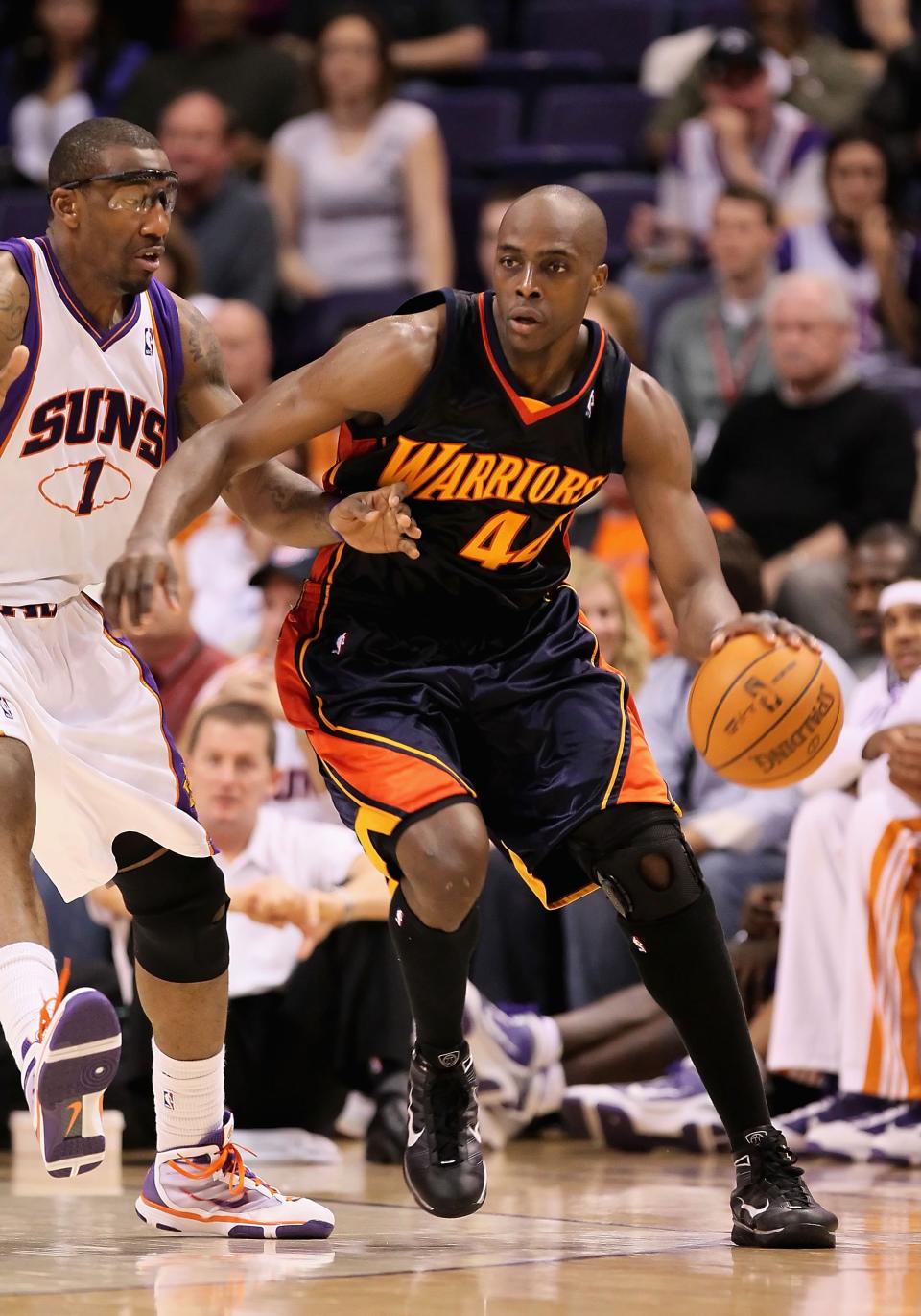
AT: Pieces of advice, I would say trust the process. It’s truly about consistency and working every single day to perfect your craft. The model works even on days that don’t feel like it’s working. There are days that felt like I put in the work, time, and effort, but I don’t see the results. Many times that can turn into me giving up or changing course. Something kept me going in the right direction. So, I would say the biggest thing is to stay with, trust the process, and put in consistent hard work, and things will work out. What’s one
Do you have any regrets?
AT: I would probably have been a little bit more aggressive. I say that meaning my natural tendency on the court is to be unselfish, make the extra pass, and be a great teammate, which is not a bad thing whatsoever. But I think I did that sometimes to the detriment of my personal success. I probably could have been more productive. If I would have, you know, been more like, hey, if it’s clear, make the pass. But if it’s 50/50, be aggressive. I think that might have been good for my career as a whole. But at the end of the day, it all happens for a reason. I would say that would be the only thing. If I look back at my career and say, if there’s one thing you could do differently, what could have been done differently? That would have been the one thing.
What do you want Anthony Tolliver to be synonymous with?
AT: Honestly, years from now, 10, 50 years from now, I don’t even care if my name is synonymous with the game. I actually prefer people to see the things I’ve done outside of basketball and be associated with those things even more. To me, basketball is a tool, a game, but it’s truly just that, a game. It’s not my life, and it shouldn’t be people’s lives. It’s something you can use and maximize. For me, I maximize the game to the nth degree, way more than I ever thought I could. So yeah, businessman, great father, great husband. More important than all that, a man of God, but someone who has been successful wherever he goes. That’s where I want to be known as.
Do you have any business ventures or endeavors you’re pursuing now?
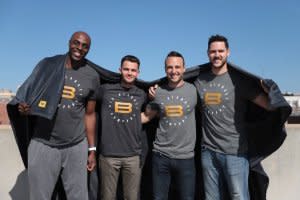
AT: I mean, I do a lot of different things. Done a lot of investing and a lot of things I would say, one of the more forward-facing brands that anybody can relate to and potentially be a customer for is Big Blanket. So I was the co-founder of Big Blanket Co. That’s one of those companies I feel like everybody can relate to and benefit from. Something that is a fun, great gift. It’s something that I love to tell people about because it’s just a great business.

 Yahoo Sports
Yahoo Sports 
